
When trade expert Jason Hunter humiliated Jonathan Isaby in a radio debate with come cold, hard facts the encounter went viral. Here he outlines some more incontrovertible truths to further demolish the Brexiteers’ bluster
‘Falling back onto WTO terms is nothing to worry about…’ So say many Brexiteers. But is true? First, it’s helpful to explain a little about our relationship with the organisation. The UK has been a member since the late 1940s when the Global Agreement on Tariffs and Trade (GATT) was agreed.
However, since representing ourselves as a single country against 163 others wields less influence that being represented by the largest single market on the planet, the UK parliament nominated the EU to represent us at the WTO. As the UK is the third largest member of the EU28 – after Germany and France – the country punches above its weight inside the Union and therefore is also over-represented at the WTO – as things stand.
WTO members have agreed with each other how they treat imports from other nations with which they do not have any kind of free trade deal – these are what are commonly termed as ‘third country relationships’. It is not pretty, but it works: if you have no trade deal with a county, you apply a pre-agreed set of tariffs (usually some of the highest) on your imports from that country and these tariffs must be applied to everyone equally – no special treatment for one or you must offer it to all.
At 11.01pm, UK time, on March 29, 2019, the UK becomes a ‘third country’ to all 163 other members of the WTO and everything that we currently sell becomes more expensive for our customers to buy around the world. This includes the 46% of our exports into the EU27 and the 54% that goes elsewhere. It has been stated by Brexiteers that this 54% is currently traded under WTO rules. This is true, but thanks to our EU membership we currently have 34 trade deals with blocs and individual countries that allow the UK to export under preferential terms.
These 34 deals cover 60 countries outside the EU, giving us 87 countries where UK manufacturers can sell effectively. Currently, these markets cover 90% plus of our exports. The moment the UK leaves the EU legally our access to these deals terminates and everything we sell becomes more expensive for our overseas customers to buy. If your product costs your customer £100 today, and post-Brexit, it has a 10%, 20% or even 30% tariff applied to it by the importing country, and there is a stack of new export paperwork that you and your customer has to fill in, you have to wonder why your international customers will continue to buy from you.
There are currently 334,000 UK small and medium-sized enterprises trading inside the EU on a straightforward basis, which means it as easy to ship goods from Birmingham to Leeds, Liverpool or Newquay as it is to Lyon, Bratislava or Athens. After Brexit, every one of these companies must be prepared for the EU to treat the UK as a third country.
So, while your European customer must pay a higher price for your goods (or, perhaps, just go elsewhere), you will have to have your export documentation in order. That means: making sure you have your new Economic Operator Registration and Identification scheme (EORI) number; checking the International Commercial Terms (Incoterms) on all your contracts to show you are now and exporter and not a partner; and considering how you will submit export declarations – including whether to engage a customs broker, freight forwarder or logistics provider.
Businesses that want to do this last function themselves will need to acquire the appropriate software and secure the necessary authorisations from HMRC. And, of course, whether you engage a customs broker or acquire the appropriate software and authorisations from HMRC, it will come at a cost.
Oh, and you’ll probably want to ensure you’ve checked the tariff rate on all your different product types in all the various destination countries that you sell into. You also need to check if your products need an export licence on top of the new export declarations paperwork, make sure that you’ve submitted all the relevant forms before shipping your goods and check whether you need to pay the third country import duty before, or whether you are going to force your customers to pay the duty up-front.
This rough guide barely scrapes the surface of what is involved. If you would like more information on how to export, the government provides a raft of detailed information for you to get your head around on the gov.uk website. It is two years out of date at the time of writing, so good luck with that.
While online, you could also read the ‘Brexit preparedness notices’ published by the European Commission (ec.europa.eu/info/brexit/brexit-preparedness/preparedness-notices_en). And I would seriously urge every business person in the UK to do so.
If, having done so, you still think falling back on WTO terms is nothing to worry about, then read them again. Is your business safe from Brexit? Is your job safe? Are you sure?
Jason Hunter has negotiated trade deals both within the EU and without









